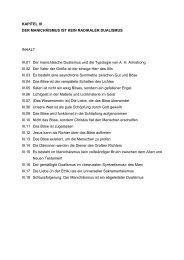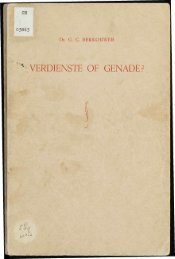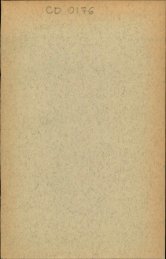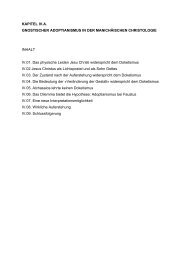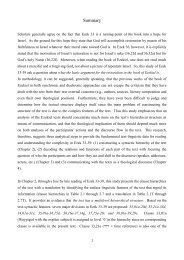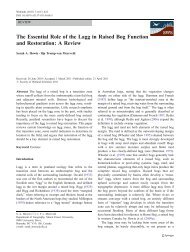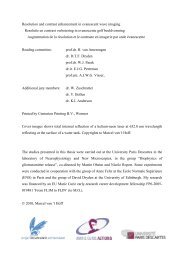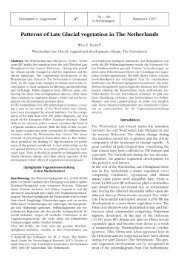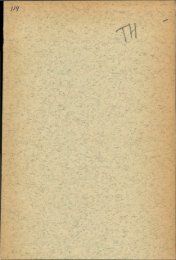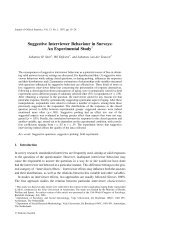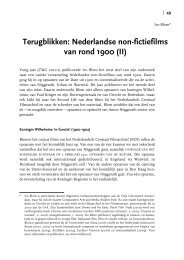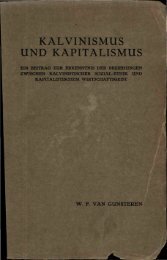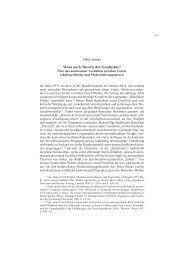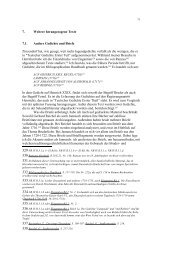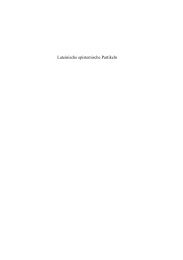PIETER A. VERBURG AND THE HISTORY OF LINGUISTICS A bio ...
PIETER A. VERBURG AND THE HISTORY OF LINGUISTICS A bio ...
PIETER A. VERBURG AND THE HISTORY OF LINGUISTICS A bio ...
You also want an ePaper? Increase the reach of your titles
YUMPU automatically turns print PDFs into web optimized ePapers that Google loves.
From: Language and its Functions. A historico-critical study of views concerning the functions of language from the prehumanistic<br />
philology of Orleans to the rationalistic philology of Bopp by Pieter A. Verburg. Transl. by Paul B.<br />
Salmon. Amsterdam & Philadelphia: John Benjamins 1998, vii-xx. ISBN 90-2724572X /1556196210.<br />
<strong>PIETER</strong> A. <strong>VERBURG</strong> <strong>AND</strong> <strong>THE</strong> <strong>HISTORY</strong> <strong>OF</strong> <strong>LINGUISTICS</strong><br />
A <strong>bio</strong>-bibliographical account<br />
1. Academic and historical background<br />
Jan Noordegraaf<br />
After studying classical languages at the Vrije Universiteit, Amsterdam, and spending two<br />
semesters at German universities, first in Freiburg and later in Berlin, Pieter Adrianus Verburg<br />
(1905-1989) worked in London for some time as a private tutor. There he started his research for<br />
a doctoral dissertation on metaphor as an essential feature of language in general, using the<br />
extensive library of the British Museum. On his return to the Netherlands, he consulted his<br />
former teacher, Professor Hendrik J. Pos (1898-1955), who informed him that a dissertation on<br />
this subject was already in preparation. This was the thorough and voluminous study of "The<br />
Concept of Metaphor" by Cornelis F. P. Stutterheim (1903-1991), which appeared in 1941; and it<br />
was a result of these "special circumstances" as he put it, that Verburg was among the first to<br />
publish a review of Stutterheim's work.<br />
In 1938, Verburg, now a Classics teacher at Wageningen, set out on another project. Inspired<br />
by Dr Anton J.B.N. Reichling, S.J. (1898-1986), later to become professor of General Linguistics<br />
at the Municipal University of Amsterdam, and his dissertation on "The Word. A study of the<br />
basis of language and language use" (1935), Verburg undertook an investigation into "The<br />
Concept of the Root in Linguistics". During the Second World War he became involved in the<br />
resistance movement - where he was known as 'Piet' or '(Piet) van Wijngaarden' - and, as a result,<br />
his research activities slackened and eventually came to a standstill. The book was nearly finished,<br />
however, when in the turmoil caused by the Battle of Arnhem in 1944, his manuscripts, notes<br />
and library were destroyed. Remnants of the lost dissertation are still to be found in an article<br />
(Verburg 1951b) dealing with some trends and facts in the development of the theory of<br />
language in the period 1800-1940 , in the course of which the concept of the root in the works of<br />
Franz Bopp (cf. also [VIII] Verburg 1950), Friedrich Schlegel, Jacob Grimm and August<br />
Schleicher is briefly discussed.<br />
1<br />
Early in 1944 Verburg unfolded his views about the place to be held by the resistance<br />
movement after the liberation; to his mind, the resistance should become the centre of a national<br />
spiritual revival. He launched a series of five clandestine pamphlets under the title De Nieuwe<br />
Wijnzak, in which he developed his ideas further. De Nieuwe Wijnzak was meant to be an explicitly<br />
2<br />
national and non-political journal for the resistance movement itself. For his activities in the<br />
1 This paper was part of a lecture given at a conference of the Association for Calvinist Philosophy at<br />
Amsterdam in January 1944, as Verburg acknowledged in a footnote.<br />
2 At the SD, the German Sicherheitsdienst, the journal was characterized as "Blatt für Intellectuelle<br />
zwecks Zusammenschliessung zur politischen Einheit", as Verburg related to Lydia Winkel (letter of 19<br />
May 1950, Nederlands Instituut voor Oorlogsdocumentatie (NIOD), Amsterdam). For a concise<br />
characterization of these brochures cf. Winkel 1989: 164-165.<br />
1
underground resistance Verburg was awarded the 'Verzetsherdenkingskruis' (Cross of the<br />
Resistance).<br />
In the papers contributed by him to De Nieuwe Wijnzak Verburg stressed among other things<br />
the moral obligation to support the victims of war and persecution and the surviving relatives of<br />
the members of the resistance. In addition to that, he argued for the foundation of a national<br />
organization which was to promote the deepening of the national consciousness. The first<br />
initiative resulted in the establishment of the 'Stichting 1940-1945', which still exists (cf. Verburg<br />
1951c; Boucher et al. 1985: 17-19); the second one led to the creation of 'Het Nationaal<br />
Instituut', a foundation which in the beginning was generously supported by the Dutch<br />
government (cf. for interesting details Verheul & Dankers 1990). Verburg became one of the two<br />
directors of the 'Instituut', and sought to put his grand and lofty ideas into the practice of the<br />
Dutch post-war society. Among other things, he organized a Congress on the Future of Dutch<br />
Culture which was held in Nijmegen in August 1946 (cf. Algra 1946).<br />
Verburg was forced to spend some time in Switzerland from mid-1946 for health reasons; in<br />
3<br />
the meantime the activities of the National Institute stagnated and eventually came to an end. It<br />
was only in mid-1948 that Verburg resumed his activities as a teacher, and motivated by Anton<br />
Reichling decided to start research for another dissertation. That Verburg's magnum opus was<br />
composed in a relatively short time is a fact which the reader may find [IX] reflected in its style.<br />
"Reading the book is [...] not reading a polished and reworked final arrangement of scholarly<br />
research but a long and always arresting creative discourse", Shetter (1966: 189) commented on<br />
the original Dutch version. On 30 November 1951 Verburg received his doctorate cum laude at his<br />
alma mater having defended his Taal en Functionaliteit. Een historisch-critische studie over de opvattingen<br />
aangaande de functies der taal vanaf de prae-humanistische philologie van Orleans tot de rationalistische linguistiek<br />
van Bopp. The year 1957 saw his appointment as a Professor of General Linguistics at the State<br />
University of Groningen, which meant the further enlargement of General Linguistics as an<br />
autonomous discipline, a broadly based development which was under way in Dutch universities<br />
in the 1950s. In the mid-sixties Philosophy of Language was officially added to Verburg's<br />
teaching commitment. On the occasion of his retirement, in 1975, he was presented with a<br />
Festschrift under the title of Ut Videam. Contributions to an understanding of linguistics (Abraham<br />
1975).<br />
It is obvious that Taal en Functionaliteit was not the output of research done by a young<br />
linguist, but the work of a secondary school teacher in his mid-forties, a widely-read classical<br />
scholar who in the course of the 1930s and 1940s had been engaged in writing two other books,<br />
and consequently had had the opportunity to develop views of his own, not only on linguistics<br />
and its history, but also on matters philosophical.<br />
2. Formative factors in the genesis of Taal en Func tionaliteit<br />
Verburg's valedictory lecture in the University of Groningen, Stand en Zin van de Historie der<br />
Taaltheorieën ('The Condition and Purpose of the History of the Theories of Language', 1975),<br />
opens with a reference to the courses in general linguistics he had followed when a young student<br />
at Amsterdam. These courses were given Hendrik Josephus Pos, a linguist and philosopher who<br />
had been appointed professor of general linguistics and classical philology at the Vrije<br />
Universiteit in Amsterdam in 1923. In these (unpublished) lectures (1924-1932) the history of<br />
linguistics was discussed extensively. Pos made an attempt to delineate the development of<br />
western linguistic thought from the discussions of the Greeks to contemporary linguistics.<br />
3 The National Institute was officially closed down on 1 March 1947. Its body of ideas, however, live<br />
on in the well-known 'Prins Bernhard Fonds', which stimulates and promotes Dutch cultural life.<br />
2
Verburg recalled how his teacher followed a dual method in his lectures:<br />
On the one hand, he developed a positive statement of his own theoretical understanding<br />
of the essence - or, as it was called then, the idea of language. At the same time, he<br />
discussed critically and historically concepts of other linguists, past and present. The two<br />
methods were intimately linked. The design and development of his own theory gained<br />
depth and perspective by simultaneous confrontation with other basic models and,<br />
conversely, in adopting a critical [X] stance, this historical research drew on the essential<br />
criteria from his own theoretical principles, or more specifically, on principles of linguistic<br />
philosophy.<br />
[Enerzijds ontwikkelde hij thetisch eigen theoretisch inzicht in het wezen - of, zoals dat<br />
toen heette: de idee der taal -, anderzijds behandelde hij critisch-historisch concepten van<br />
anderen in verleden en heden. De twee methoden stonden in nauwe correlatie tot elkaar.<br />
Opzet en uitbouw van eigen theorie wonnen aan diepte en perspectief door de<br />
gelijktijdige confrontatie met andere grondmodellen en, omgekeerd, ontleende dit<br />
historisch onderzoek, om critisch te kunnen wezen, de nodige criteria weer aan eigen<br />
theoretische, wil men: taalfilosofische principiën. (Verburg 1975: 3) 4<br />
Although Verburg did not consider himself one of Pos's disciples in the proper sense of the<br />
word, he stated that he had found this "dual method" most instructive, and consequently had<br />
sought to apply it in his own academic teachings (ibid.). "My dissertation likewise adopted this<br />
double approach, both historical and critical" (Auch meine Doktorschrift ... war 'zweiseitig' kritischhistorisch),<br />
Verburg noted as late as 1983 (Verburg 1983: 2). Thus it is apparent that Verburg<br />
deemed Pos's courses on the history of the theories of language to be most valuable; they may<br />
indeed be considered to contain the germs of Verburg's final doctoral dissertation, Pos's<br />
<strong>bio</strong>grapher argued (Derkx (1994: 50), and I would endorse this view. As Verburg himself<br />
acknowledged, he actually returned to Pos's lecture notes on several occasions when preparing<br />
his book; and as late as September 1951, he wrote a letter to his former teacher requesting more<br />
specific information on Knaustinus (1524 - c. 1590) and his Lingua (1566), referring to Pos's<br />
lectures from the late 1920s which included a discussion of this work.<br />
Touched by a cordial and personal letter Pos had written to him following the defence of his<br />
doctoral dissertation Verburg replied that as a student he had been captivated "by your inner<br />
critical reservation (epoche)". Moreover, as Verburg knew, Pos had "decidedly and resolutely made<br />
the choice for the resistance" during the Second World War. Therefore, "your appreciation gives<br />
6<br />
me intense satisfaction". In 1954, Pos wrote to Verburg that he would [XI] applaud "your<br />
7<br />
possible acting as a 'privaat docent' in the history of (general) linguistics". The next year,<br />
however, saw Pos's untimely death.<br />
4 In his 1957 inaugural lecture he had also referred to the approach Pos used in his linguistic and<br />
philological lectures.<br />
5 For an overview of the contents of Pos's unpublished lectures cf. Noordegraaf 1990: 172-175,<br />
Derkx 1994: 521-524. Note that Pos himself did not publish very much on the history of linguistics.<br />
6 Letter of 15 January 1952, Archief Pos, University Library Amsterdam. Note that Pos had secured<br />
him a scholarship so that Verburg could spend the winter semester 1932-1933 in Freiburg i. Br. (van<br />
Houten 1989: 5; cf. Verburg 1988: 287).<br />
7<br />
Letter of 14 April 1954, private collection. A 'privaat docent' was an external unsalaried lecturer.<br />
3<br />
5
It was Anton Reichling, Professor at the Municipal University of Amsterdam, who in 1948<br />
had given Verburg a decisive impetus to write Taal en Functionaliteit. Even so, he decided to<br />
pursue his study as a doctoral dissertation under the supervision of Jacobus Wille (1881-1964),<br />
Professor of Dutch Language and Literature at the Vrije Universiteit. Wille, a specialist on the<br />
eighteenth century and keenly interested in the history of the study of Dutch, also taught General<br />
Linguistics after Pos had left this university to take up the chair of Philosophy at the Municipal<br />
University of Amsterdam. Thus, after twenty-odd years Verburg returned to his alma mater, and<br />
he did that, I feel, not just for sentimental reasons. The point is the following: the Vrije<br />
Universiteit was not a state university or a church university, but a 'free' university, funded by a<br />
Society which in the 1950s was still based on rather strictly Calvinist, that is to say Reformed<br />
principles which Verburg had always felt a close affinity with. It may be argued then that part of<br />
the background to Verburg's studies is to be found in the author's life-long loyalty to these<br />
principles. As Verburg related himself in 1983:<br />
At the end of the 1920s two Amsterdam professors, H. Dooyeweerd [(1892-1978)] ... and<br />
D.H.T. Vollenhoven [(1894-1977)], advocated a new direction in philosophy. Their<br />
philosophy was known as the Wijsbegeert der Wetsidee ("Philosophy of the Concept of<br />
Law"), known in the U.S.A. and elsewhere as 'Cosmonomics'.<br />
[...] Pos's philosophy of language seemed to me to be confined to a very indefinite<br />
description; hence I was all the more deeply impressed by the Cosmonomists'<br />
pronounced tendency towards a creative realism which was totally different from<br />
mediaeval realism, but as I came to realize only later, bore a certain resemblance to<br />
Nicolai Hartmann's realism - though the latter's secularist principles stood in stark<br />
contrast to the Christian inspiration of cosmonomic philosophy.<br />
[Ende der zwanziger Jahren vertraten in Amsterdam zwei Professoren eine neue<br />
philosophische Richtung: H. Dooyeweerd (...) und D.H.T. Vollenhoven, der als Theologe<br />
begonnen hatte. (...). Ihre Philosophie wurde bekannt als "Wijsbegeerte der Wetsidee"<br />
(Philosophie der Gezetzesidee); in den USA und auch anderswo kam der Name<br />
"Cosmonomics" auf.<br />
(...) Die Sprachphilosophie von Pos blieb mir zu sehr in einer unentschiedenen<br />
Beschreibung stecken. Desto mehr war ich von den Kosmonomikern [XII] wegen ihrer<br />
entschiedenen Wendung zu einem schöpferischen Realismus beeindruckt, der keineswegs<br />
dem mitteralterlichen glich, sondern - wie ich freilich erst später erkannte - eine gewisse<br />
Ähnlichkeit zu Nicolai Hartmanns Realismus aufwies, dessen Säkularismus jedoch in einer<br />
unversöhnlichen Antithese zur christlich inspirierten kosmonomischen Philosophie steht.<br />
(Verburg 1983: 2)].<br />
The 'normative' stance the reader will find in Language and its Functions and, among other things,<br />
the idea that language has its autonomy have to do with the fact that Verburg was an adherent of<br />
8<br />
the "philosophy of the concept of law". It was Vollenhoven to whom Verburg owed the<br />
9<br />
distinction between 'scientialism' and 'practicalism', and to whose Festschrift of 1951 he<br />
contributed a paper on the history of linguistics; in a contribution to a Festschrift for<br />
Dooyeweerd (1965) he expounded his own 'delotic' (expository) linguistic theory (cf. Verburg<br />
8 2<br />
For details concerning this type of philosophy, see Dooyeweerd 1954-1958; 1969.<br />
9 The two terms are rendered in the translation of Taal en Functionaliteit as 'axiomatic rationalism' and<br />
'pragmatic rationalism' respectively.<br />
4
1971a and 1983). A member of the Calvinist Association for Philosophy, founded in 1935,<br />
Verburg published his first papers on matters linguistic (1941 ff.) in the journal of this<br />
association. In a lecture given in 1944, he claimed that only the Wijsbegeerte der Wetsidee was able to<br />
'place' certain developments in linguistics; it could give excellent service in elucidating linguistic<br />
viewpoints (cf. Verburg 1951b: 30-31). Verburg's philosophical basic views, then, took shape<br />
under the influence of the Calvinist philosophy as it began to develop in the early 1930s. It<br />
provided him with the framework he needed to analyse the wealth of linguistic-historiographical<br />
data. In this sense, too, one might say that not only Pos's lectures but also a wide variety of other<br />
"difficult material has for better or worse been passed through the writer's personal mill" (Shetter<br />
1966: 189).<br />
One of his reviewers thought it salutary that "in opposition to the often rather hollow<br />
relativistic attitude pf the present-day Verburg does not disavow his Calvinist orthodoxy" (de<br />
Witte 1954: 514). It goes without saying that not all of his critics shared this type of philosophy<br />
of life, but, at any rate, it did not render "the historiography less acceptable to different-minded<br />
readers", as Stutterheim (1954a: 219) dryly remarked. 10<br />
3. The intellectual context of Taal e n Func tio nalite it<br />
In the Netherlands at least, Pos's historical-critical approach in his courses on [XIII] general<br />
linguistics seems to have been something of a novelty at the time. At other Dutch universities<br />
1<br />
Hermann Paul's (1846-1921) Prinzipien der Sprachgeschichte ( 1880) or introductions to historicalcomparative<br />
grammar were used as textbooks for general linguistics. Moreover, as it appeared to<br />
Verburg (1975: 10), there was never any keen interest in the history of linguistics among the<br />
inter-war generation of linguists. He was of the opinion that the histories of linguistics which had<br />
appeared since Benfey's voluminous Geschichte der Sprachwissenschaft 1869 had been of slender<br />
compass, and in addition gave little more than a recital of facts. It seems that Pos has had similar<br />
feelings. Several of his statements reflect this: "A correct assessment of Scaliger's contribution to<br />
the development of grammar can only be made when the history of linguistics has been studied<br />
methodically", Pos remarked in 1927. A few years later, he spoke about the history of linguistics<br />
as having been neglected up to that time (cf. Noordegraaf 1990: 166; 1997: 167).<br />
It should be noted, however, that since the turn of the century the Netherlands have seen a<br />
fairly continuous interest in the history of the individual language disciplines, which yielded<br />
various articles and dissertations dealing with specific historical aspects of the study of, for<br />
instance, Greek, Dutch or French. In addition, one can point to the noted and frequently<br />
practised 'introductory' genre, composed in the wake of Berthold Delbrück's (1842-1922) wellknown<br />
Einleitung in das Studium der Indogermanischen Sprachen. Ein Beitrag zur Geschichte und Methodik<br />
1<br />
der vergleichenden Sprachforschung ( 1880), books offering a concise historical survey, in which the<br />
author presents a brief overview of the development of linguistics from Plato's Cratylus to the<br />
present day, the main point, however, being the development of nineteenth-century comparative<br />
historical linguistics.<br />
Be this as it may, in the early 1950s the state of the art of general linguistics was such that<br />
Stutterheim, who may be considered an expert in the field at the time, was forced to conclude<br />
that in the Netherlands "very few studies were devoted to the history of language theory"<br />
(Stutterheim 1954a: 220). One might seriously doubt whether the situation elsewehere was much<br />
more favourable, the more when one remembers Aarsleff's dictum on the late 1950s: "In those<br />
days there was no interest in the history of linguistics" (Aarsleff 1982: 5). At any rate, in the 1950s<br />
10 Note, however, that Beth (1953: 94) pointed to the risk of a certain dogmatism, "from which the<br />
author, as it appears to me, has not always escaped".<br />
5
it appears to have been common practice, "a matter of principle, in fact, to regard all<br />
investigations and statements made before the time of Wilhelm von Humboldt and Franz Bopp<br />
as 'pre-scientific' and utterly unremarkable. There were few exceptions, and, De Mauro (1990:<br />
159) decided, Verburg was one of them. [XIV]<br />
As a matter of fact, it was R.H. Robins's Ancient and Mediaeval Grammatical Theory in Europe with<br />
Particular Reference to Modern Linguistic Doctrine (1951) and Verburg's Taal en Functionaliteit (of the<br />
same year) which have been regarded as the first serious linguistic-historiographical studies in the<br />
post-war era, to which Arens's 1955 well-known anthology of texts in the history of linguistics<br />
may be added. As one of the contemporary reviewers put it: Verburg's study "should be<br />
recognized as probably the most important general treatment of the subject since the basic works<br />
of Benfey and Steinthal [...] Yet, it is something more than a supplement to earlier studies of<br />
theories of language. It marks an advance in the understanding of the place of theories of<br />
language in the history of ideas" (Faithfull 1953: 144). In 1974, Hymes considered the importance<br />
of this "pioneering, unique study" to lie in its relevance to those engaged in sociolinguistics and<br />
other related approaches, wherein functional questions loom large (Hymes 1974: 27).<br />
Following the rapid expansion of linguistic historiography in the last quarter of the twentieth<br />
century the present-day reader may ask other questions or deem other issues of more<br />
importance. Certain questions and certain issues, however, appear to be perennial, and these<br />
about language and its functions are definitely among them.<br />
References and sources of information<br />
N.B. For further details about the life and times of Pieter A. Verburg the reader is particularly<br />
referred to Abraham & Stuart 1975, and to Verhaar 1989. References to writings by Verburg<br />
himself cited in the text above are omitted here, but included in the list of his works given below.<br />
Aarsleff, Hans (1982). From Locke to Saussure. Essays on the Study of Language and Intellectual History<br />
London: Athlone.<br />
Abraham, Werner, ed. (1975). Ut Videam. Contributions to an understanding of linguistics. For Pieter<br />
Verburg on the occasion of his 70th birthday. Lisse: de Ridder.<br />
Abraham, Werner & Don Graham Stuart (1975). "A brief <strong>bio</strong>graphy of Pieter A. Verburg,<br />
professor of general linguistics in the National University at Groningen". Abraham 1975, 8-15.<br />
Algra H. et al. (1946) De toekomst der Nederlandse beschaving. Verslag van het Congres van 28-30 Augustus<br />
1946 te Nijmegen, gehouden door Het Nationaal Instituut. Amsterdam.<br />
Arens, Hans (1955). Sprachwissenschaft. Der Gang ihrer Entwicklung von der Antike bis zur Gegenwart.<br />
Freiburg & München: Alber. (2nd ed., revised and enlarged, 1969).<br />
[XV]<br />
Benfey, Theodor (1869). Geschichte der Sprachwissenschaft und orientalischen Philologie in Deutschland seit<br />
dem Anfange des 19. Jahrhunderts mit einem Rückblick auf die früheren Zeiten. München: Cotta. (Repr.<br />
New York & London: Johnson, 1965).<br />
Boucher, Florine, Els Kalkman & Dick Schaap, eds. (1985). Woord gehouden. Veertig jaar Stichting<br />
1940-1945. 's-Gravenhage: Staatsuitgeverij.<br />
6
Daalder, Saskia (1999). H.J. Pos (1898-1955): studies over zijn filosofie van taal en taalwetenschap met een<br />
bibliografie van gepubliceerde commentaren op zijn persoon en werk. Two vols. Doctoral diss. Vrije<br />
Universiteit Amsterdam.<br />
De Mauro, Tullio (1990). "Nachwort". Donatella di Cesare & Stefano Gensini (eds.). Iter<br />
Babelicum. Studien zur Historiographie der Linguistik. 1600-1800. Münster: Nodus, 159-164.<br />
Derkx, Petrus H.J.M. (1994). H.J. Pos, 1898-1955: Objectief en partijdig. Biografie van een filosoof en<br />
humanist. Hilversum: Verloren.<br />
2<br />
Dooyeweerd, Herman (1953-1958, 1969) . A New Critique of Theoretical Thought [Translation of De<br />
Wijsbegeerte der Wetsidee (1935)]. 4 vols. Amsterdam: H.J. Paris & Philadelphia: Presbyterian &<br />
Reformed Publishing Co.<br />
Faithfull, R.G. (1953). Review of Verburg 1952. Archivum Linguisticum 5, 144-150.<br />
H[outen], T.B. van (1989). "Prof. Dr. P.A. Verburg". Mededelingen I.C.F. Nederland 33.2, 5-6.<br />
Hymes, Dell (1974). "Introduction. Traditions and paradigms". Dell Hymes (ed.). Studies in the<br />
History of Linguistics. Traditions and paradigms. Bloomington & London: Indiana Univ. Press., 1-38.<br />
Koerner, E.F.Konrad (1978a). "Linguistic Historiography till 1970". Towards a Historiography of<br />
Linguistcs. Selected essays. Amsterdam: Benjamins, 3-20.<br />
—. (1978b). Western Histories of Linguistic Thought. An annotated chronological bibliography, 1822-1976.<br />
Amsterdam: Benjamins.<br />
Noordegraaf, Jan (1990). "Pos als geschiedschrijver van de taalwetenschap". Saskia Daalder & Jan<br />
Noordegraaf (eds.). H.J. Pos (1898-1955). Taalkundige en geëngageerd filosoof. Amsterdam: Huis aan de<br />
drie Grachten, 153-175. (Repr. in Voorlopig verleden. Taalkundige plaatsbepalingen 1797-1960 by Jan<br />
Noordegraaf. Münster: Nodus 1997, 155-177).<br />
—. (1991). "Hendrik J. Pos (1898-1955) and the History of Linguistics". Elisabeth Feldbusch,<br />
Reiner Pogarell und Cornelia Weiss eds.). Neue Fragen der Linguistik. Akten des 25. Linguistisches<br />
Kolloquiums, Paderborn 1990. Band 1: Bestand und Entwicklung. Tübingen: Niemeyer, 55-63. (Repr.<br />
in The Dutch Pendulum. Linguistics in the Netherlands 1740-1900 by Jan Noordegraaf. Münster: Nodus<br />
1996, 159-174).<br />
Noordegraaf, Jan & Frank Vonk (1996). "An 'Anatomy of Melancholy'. Writing the History of<br />
Linguistics in the Netherlands, 1900-1990". Herbert Brekle, Edeltraud Dobnig-Jülch & Helmut<br />
Weiß (eds.). A Science in the Making. The Regensburg Symposia on European Linguistic Historiography.<br />
Münster: Nodus, 137-163.<br />
Parret, Herman & Roger Van de Velde (1980). "Structuralism in Belgium and the Netherlands".<br />
Semiotica. 29, 145-174.<br />
Robins, Robert H. (1951). Ancient and Mediaeval Grammatical Theory in Europe with Particular Reference<br />
to Modern Linguistic Doctrine. London: G. Bells & Sons.<br />
7
Shetter, William Z. (1966). Review of Verburg 1952. Foundations of Language 21, 187-189.<br />
[XVI]<br />
Stutterheim, Cornelis F.P. (1941). Het Begrip Metaphoor. Een taalkundig en wijsgerig onderzoek.<br />
Amsterdam: H.J. Paris. (Doctoral dissertation Municipal University Amsterdam).<br />
—. (1954a). Review of Verburg 1952. Levende Talen 1954, 218-220.<br />
—. (1954b). Review of Verburg 1952. Museum 59, cols. 113-116.<br />
—. (1988). "Reminiscenses of an old language researcher". Historiographia Linguistica 15, 317-329.<br />
Verhaar, John W.M. (1989). "In memoriam P.A. Verburg". Studies in Language 13, 253-255.<br />
Verheul, Jaap & Joost Dankers (1990). "Het Nationaal Instituut". Tot stand gekomen met steun van ....<br />
Vijftig jaar Prins Bernhard Fonds, 1940-1990. Zutphen: De Walburg Pers, 44-93.<br />
Winkel, Lydia E. (1989) De ondergrondse pers 1940-1945. Geheel herzien door Hans de Vries.<br />
Amsterdam: Veen (1st ed. 's-Gravenhage, 1954).<br />
Publications by Pieter A. Verburg<br />
N.B. This list does not claim to be complete in respect either of Verburg's unsigned papers or of<br />
his papers concerning the Nationaal Instituut.<br />
1941<br />
Review of Cornelis F.P. Stutterheim, Het begrip Metaphoor. Amsterdam 1941. Correspondentiebladen<br />
van de Vereniging voor Calvinistische Wijsbegeerte 6, 85-87.<br />
1942<br />
"Steekproeven" (Review of Karl Bühler, Sprachtheorie. Jena 1936). Correspondentiebladen van de<br />
Vereniging voor Calvinistische Wijsbegeerte 7, 59-61.<br />
Review of Karl Vossler, "Benedetto Croces Sprachphilosophie", Deutsche Viertelsjahrsschrift für<br />
Literaturwissenschaft und Geistesgeschichte XXIX, 2 (1941). Correspondentiebladen van de Vereniging voor<br />
Calvinistische Wijsbegeerte 7, 113-116.<br />
1944<br />
De Nieuwe Wijnzak. Leidraad tot verdieping van het staatsburgerlijk denken - door en voor werkers en<br />
verzetters. S.l., s.a. No. 1-4 (Febr. 1944 -August 1944); plus one special issue. [In these brochures<br />
one also finds anonymus papers written by other authors; cf. Winkel 1989:165].<br />
1945<br />
8
Het Nationaal Instituut, Department voor Volksvoorlichting, dat .... geen departement is; waarom? waartoe?<br />
hoe? Amsterdam: Het Nationaal Instituut. 12 pp.<br />
[XVII]<br />
Gedachte en doel van het Nationaal Instituut. Het probleem van ons nationaal bewustzijn en onze nationale<br />
gemeenschapszin. Amsterdam: Het Nationaal Instituut 19 pp. [original stencilled edition 1944]<br />
["Address"]. Kort Verslag van de Constituerende Vergadering van het Nationaal Instituut gehouden op Vrijdag<br />
12 en Zaterdag 13 October 1945 te Amsterdam, 16-22. [Amsterdam: Het Nationaal Instituut].<br />
"Steekproeven. K. Bühler (vervolg)". Correspondentiebladen van de Vereniging voor Calvinistische<br />
Wijsbegeerte 8, 15.<br />
1950<br />
"The Background to the Linguistic Conceptions of Bopp". Lingua 2, 438-468.<br />
1951<br />
(1951a). Taal en functionaliteit. Een historisch-critische studie over de opvattingen aangaande de functies der taal<br />
vanaf de prae-humanistische philologie van Orleans tot de rationalistische linguistiek van Bopp. Wageningen: H.<br />
Veenman & Zonen. Doctoral dissertation Vrije Universiteit Amsterdam, 1951. xx, 464 pp.; 27<br />
'stellingen' (theses or points to be defended) appended on a separate sheet, 4 pp.<br />
(1951b). "Enkele lijnen en feiten in de ontwikkeling der taaltheorie". S.U. Zuidema (ed.).<br />
Wetenschappelijke bijdragen door leerlingen van Prof. Dr. H. Th. Vollenhoven aangeboden ter gelegenheid van<br />
zijn 25-jarig hoogleraarschap aan de Vrije Universiteit. Franeker & Potchefstroom: Wever, 13-32.<br />
(1951c). "De Stichting 1940-1945". H. van Riessen et al. (eds.). Het grote gebod. Gedenkboek van het<br />
verzet in LO en KP. Two vols. Kampen: Kok. Vol. 2: Het verzetswerk in de LO en KP, 546-555.<br />
4 ( 1989).<br />
"Zonsopgang". Correspondentiebladen van de Vereniging voor Calvinistische Wijsbegeerte 15, 11-13.<br />
1952<br />
Taal en functionaliteit. Een historisch-critische studie over de opvattingen aangaande de functies der taal vanaf de<br />
prae-humanistische philologie van Orleans tot de rationalistische linguistiek van Bopp. Wageningen: H.<br />
Veenman & Zonen 1952. (Commercial edition of 1951 dissertation. With an English summary,<br />
chronological table, index rerum, addenda.) XVI, 490 pp.<br />
- Reviewed by [Antonius] J.J. de Witte, O.P. (1952), Tijdschrift voor Philosophie 16, 513-514;<br />
Evert W. Beth (1953), Algemeen Nederlands Tijdschrift voor Wijsbegeerte 46, 94; A. Carnoy<br />
(1953), Leuvense Bijdragen 43, Bijblad, 108-110; R. Glyn Faithfull (1953), Archivum<br />
Linguisticum 5, 144-150; Walter Couvreur (1954), Revue Belge de Philologie et d'Histoire 32, 864;<br />
Cornelis F.P. Stutterheim (1954a), Levende Talen 1954, 218-220; idem, (1954b), Museum 59,<br />
cols. 113-116; William Z. Shetter (1966), Foundations of Language 21, 187-189.<br />
"De humanistische taaltheorie van Juan Luis Vives (1492-1540)". Handelingen van het twee en<br />
9
twintigste Nederlands Philologen-congres te Utrecht. Groningen: Wolters, 69-70.<br />
"Taal en wet (I)". Correspondentiebladen van de Vereniging voor Calvinistische Wijsbegeerte 16.2, 17-18.<br />
[XVIII]<br />
1953<br />
"Taal en wet (II)". Correspondentiebladen van de Vereniging voor Calvinistische Wijsbegeerte 17.2, 22-24.<br />
1954<br />
"Model-gedachte, sub-functie, betekenis". Handelingen van het drie en twintigste Nederlands<br />
Philologencongres te Nijmegen. Groningen: Wolters, 65-66.<br />
1957<br />
Algemene taalwetenschap en encyclopaedie. Rede uitgesproken bij de aanvaarding van het ambt van hoogleraar in<br />
de Algemene Taalwetenschap aan de Rijksuniversiteit te Groningen op 26 november 1957. Groningen &<br />
Djakarta: J.B. Wolters. (Inaugural lecture State University of Groningen). 23 pp.<br />
1961<br />
"Bacon als vernieuwer van de encyclopaedische idee". Algemeen Nederlands Tijdschrift voor<br />
Wijsbegeerte en Psychologie 53, 169-180.<br />
"Het optimum der taal bij Wittgenstein". Philosophia Reformata 26, 161-172.<br />
"Het schaakspel-model bij F. de Saussure en L. Wittgenstein". Wijsgerig Perspectief 1, 227-234.<br />
"Hearer-Speaker Relation in Language Theory". Henk C. Huizing et al. (eds.). Proceedings of the 2nd<br />
International Course in Paedo-Audiology, June 13 - June 16, 1961. Groningen, 29-35.<br />
1962<br />
"Some Remarks on 'Communication' and 'Social' in Language Theory". Lingua 11 (= Studia<br />
Gratulatoria dedicated to Albert Willem de Groot in the year of his seventieth birthday), 453-468.<br />
"Een boek over moderne Engelse taalfilosofie" (Review of Maxwell John Charlesworth,<br />
Philosophy and Linguistic Analysis. Pittsburgh & Louvain 1959). Bijdragen. Tijdschrift voor filosofie en<br />
theologie 23.1, 12-22.<br />
1963<br />
Review of Arno Borst, Der Turmbau von Babel. Geschichte der Meinungen über Ursprung und Vielfalt der<br />
Sprachen und Völker. Stuttgart 1957-1963. 6 vols. Lingua 12, 309-319.<br />
1964<br />
10
Vicissitudes of Paradigms. Paper prepared in advance for participants in the 25th Burg Wartenstein<br />
Symposium (August 15-12, 1964) on the theme "Revolution vs. Continuity in the Study of<br />
Language". Groningen. 31 pp.<br />
1965<br />
"Delosis and Clarity". Philosophy and Christianity: Essays dedicated to Prof. Dr. Herman Dooyeweerd.<br />
Kampen: Kok, 78-99.<br />
[XIX]<br />
"Albert Willem de Groot (Groningen, 13 januari 1892 - Laren N.H., 14 december 1963)".<br />
Jaarboek van de Maatschappij der Nederlandse Letterkunde te Leiden 1964-1965. Leiden: E.J. Brill, 66-74.<br />
1966<br />
"The Background to the Linguistic Conceptions of Bopp".Thomas Sebeok (ed.). Portraits of<br />
Linguists. A <strong>bio</strong>graphical sourcebook for the history of Western linguistics, 1746-1963. 2 vols. Vol. I. From<br />
Sir William Jones to Karl Brugmann. Bloomington & London: Indiana Univ. Press, 221-250. (Reprint<br />
of Verburg 1950).<br />
1967<br />
Review of J.A. Hutchinson, Language and Faith, Studies in Sign, Symbol and Meaning. Philadelphia<br />
1963. Linguistics 34, 118-123.<br />
1968<br />
"Ennoësis of language in 17th century philosophy". Lingua 21 (= In Honour of Anton Reichling<br />
on the occasion of his seventieth birthday), 558-572.<br />
Review of Nikunja Vihari Banerjee, Language, Meaning and Persons. London 1963. Linguistics 39,<br />
109-113.<br />
1969<br />
"Hobbes' Calculus of Words". ITL. Tijdschrift van het Instituut voor Toegepaste Linguistiek te Leuven 5,<br />
62-69.<br />
"Computational Linguistics en de buitenlandse samenwerking". Universiteit en Hogeschool 16.1, 77-<br />
82.<br />
1970<br />
"Hobbes' Calculus of Words". Statistical Methods in Linguistics 6, 60-65.<br />
1971<br />
(1971a) "De mens in de taalkunde". Truth and Reality. Philosophical perspectives on reality dedicated to<br />
11
Professor Dr. H.G. Stoker / Waarheid en Werkelikheid. Wysgerige perspektiewe op die werklikheid opgedra<br />
aan Professor Dr. H.G. Stoker. Braamfontein: De Jong, 262-282.<br />
"Het lege woord". De Gids 134, 156-158.<br />
1974<br />
"Vicissitudes of Paradigms". Dell Hymes (ed.). Studies in the History of Linguistic Traditions and<br />
Paradigms. Bloomington & London: Indiana Univ. Press, 191-230.<br />
1975<br />
Stand en zin van de historie der taaltheorieën. Afscheidscollege gegeven op 28 oktober 1975 bij zijn aftreden als<br />
hoogleraar in de Algemene Taalwetenschap en de Wijsbegeerte der Taal aan de Rijkuniversiteit te Groningen.<br />
Groningen: Wolters-Noordhoff. (Valedictory lecture State University of Groningen). 20 pp.<br />
1976<br />
"The Idea of Linguistic System in Leibniz". Herman Parret (ed.). History of Linguistic Thought and<br />
Contemporary Linguistics. Berlin & New York: de Gruyter, 593-615.<br />
[XX]<br />
1980<br />
"Discipline versus Philosophy". Dick J. van Alkemade et al. (eds.). Linguistic Studies offered to Berthe<br />
Siertsema. Amsterdam: Rodopi, 137-154.<br />
1981<br />
"Ars oder Scientia, eine Frage der Sprachbetrachtung im 17. und 18. Jahrhundert". Horst<br />
Geckeler et al. (eds.). Logos Semantikos. Studia linguistica in honorem Eugenio Coseriu, 1921-1981. Vol I:<br />
Geschichte der Sprachphilosophie und der Sprachwissenschaft. Berlin: de Gruyter / Madrid: Gredos, 207-<br />
214.<br />
1982<br />
"De plaats der taal bij onderwijs en filosofie in de Westerse cultuurgeschiedenis (tot 1700)".<br />
Lodewijk F. van Driel & Jan Noordegraaf (eds.). Studies op het gebied van de geschiedenis van de<br />
taalkunde. Kloosterzande: Duerinck-Krachten, 11-34.<br />
1983<br />
"Die Philosophie hinter einer Sprachtheorie: eine Skizze". Manfred Faust et al. (eds.). Allgemeine<br />
Sprachwissenschaft, Sprachtypologie und Textlinguistik. Festschrift für Peter Hartmann. Tübingen: Narr, 1-<br />
10.<br />
1988<br />
"Soph. Oid. Kol. 939: ëÝãù oder ëÝãùí?". Jörn Albrecht (ed.). Energeia und Ergon: Sprachliche<br />
12
Variation - Sprachgeschichte - Sprachtypologie. Studia in honorem Eugenio Coseriu.. 3 vols. Band III (ed.,<br />
with introduction by Jens Lüdtke): Das sprachtheoretische Denken Eugenio Coserius in der Diskussion (2).<br />
Tübingen: Narr, 287-291.<br />
1998<br />
Language and its functions; a historical-critical study of views concerning the functions of language from the prehumanistic<br />
philology of Orleans to the rationalistic philology of Bopp. Translated by Paul Salmon, in<br />
consultation with Anthony J.Klijnsmit. Amsterdam & Philadelphia: Benjamins (Amsterdam studies<br />
in the theory and history of linguistic science, 84). xxxiii, 577 pp.<br />
- Reviewed by Paul T. Roberge (1999), Historiographia Linguistica 26, 225-231.<br />
13



